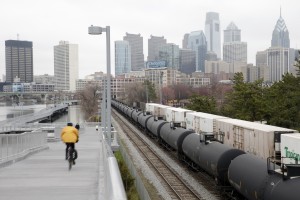Crude-by-rail shipments to eastern refineries hit new high in Feb., EIA says
-
Jon Hurdle

(AP Photo/Matt Rourke)
Oil trains like this one en route through Philadelphia carried their largest monthly total of crude to East Coast refineries in February, the federal government said.” credit=”(AP Photo/Matt Rourke)
Rail shipments of crude oil accounted for more than half of the input to U.S. East Coast refineries in February, their highest level ever, displacing some imports, according to new data from the U.S. Energy Information Administration.
As crude oil production rises in the Bakken Shale oil field of North Dakota and eastern Montana, railroads have taken advantage of strong demand from eastern refineries such as Philadelphia Energy Solutions’ plant in South Philadelphia, and Delaware City Refinery which process 160,000 barrels a day and 120,000 barrels a day, respectively.
In February, crude by rail accounted for 52% of the 24.4 million barrels shipped to refineries in the EIA’s “PADD 1” region of the Northeast, despite the fact that they have been operating at below “typical” levels, the agency said on Tuesday.
The EIA does not publish details on shipments to specific cities or refineries, breaking its PADD 1 into only two categories: “East Coast” and “Appalachian No. 1”.
Shipments from the PADD 2 Midwest region that includes oil-rich Bakken Shale field of North Dakota accounted for about 11.9 million barrels, or about half of the total, and was the largest regional contributor to the crude shipped to the eastern refineries, the EIA data showed.
“This marks the first time in EIA’s dataset that crude deliveries by rail have accounted for such a high percentage of East Coast refinery supply,” the EIA said.
The growth in rail shipments has been enabled by an increasing number of crude-unloading facilities, both at refineries and in other locations where oil is unloaded on to ships or short-distance pipeline. There are now 10 East Coast terminals that can unload crude-oil unit trains.
The combination of rising domestic production and an increasing ability to transport and refine it has cut into imports, especially from Africa, whose shipments to the U.S. from countries like Nigeria dropped by more than 90% between 2010 and 2014, the agency said last year.
In Pennsylvania, 70 to 80 trains carrying more than a million gallons of Bakken crude travel across the state to Philadelphia-area refineries each week. The volume of crude carried in the “unit trains” of 100 cars or more has fueled fears of catastrophic events like that in Lac-Megantic, Quebec where 47 people died in July 2013 when a runaway oil train exploded.
Despite four oil-train derailments in Pennsylvania since January 2014, none has exploded but residents of cities like Philadelphia fear an incident as the trains pass through densely populated areas.
In response, the U.S. Department of Transportation on May 1 released long-awaited changes in oil-train rules that will require thicker shells, electronic braking systems, and reduced speeds in urban areas for trains that don’t meet the new standards.
















